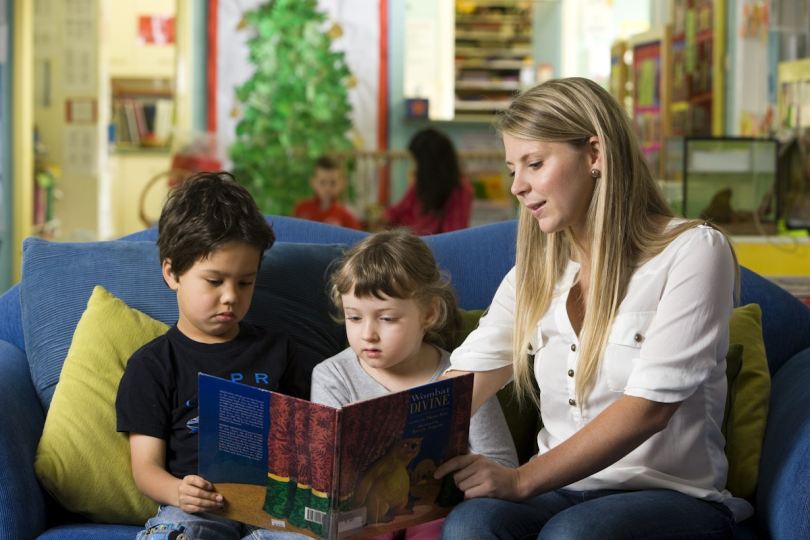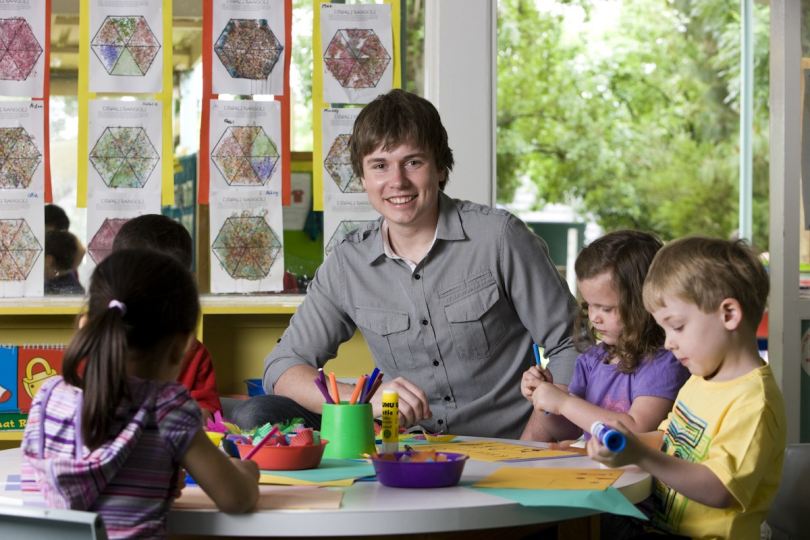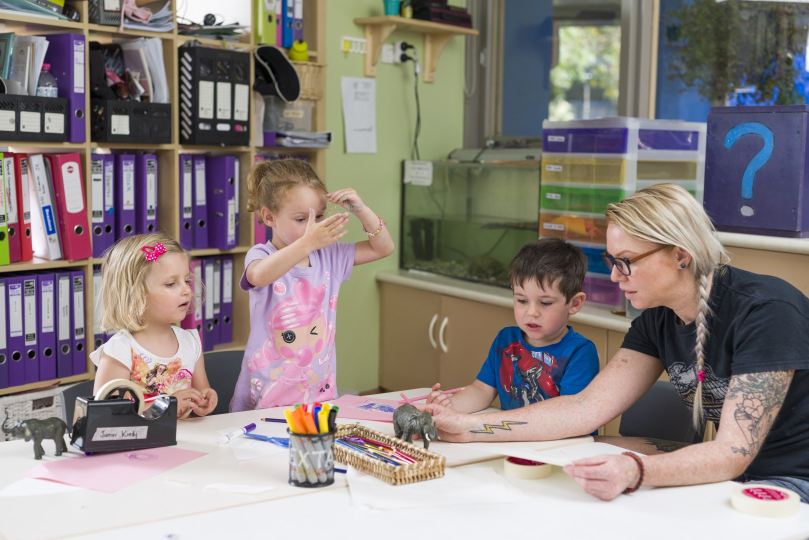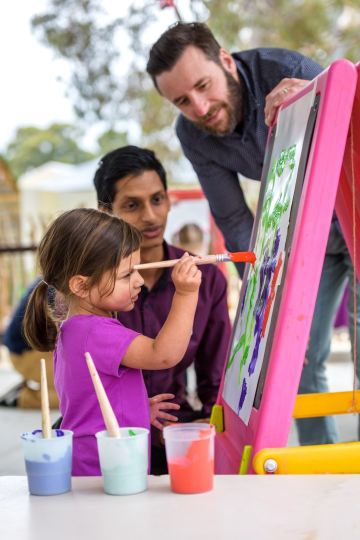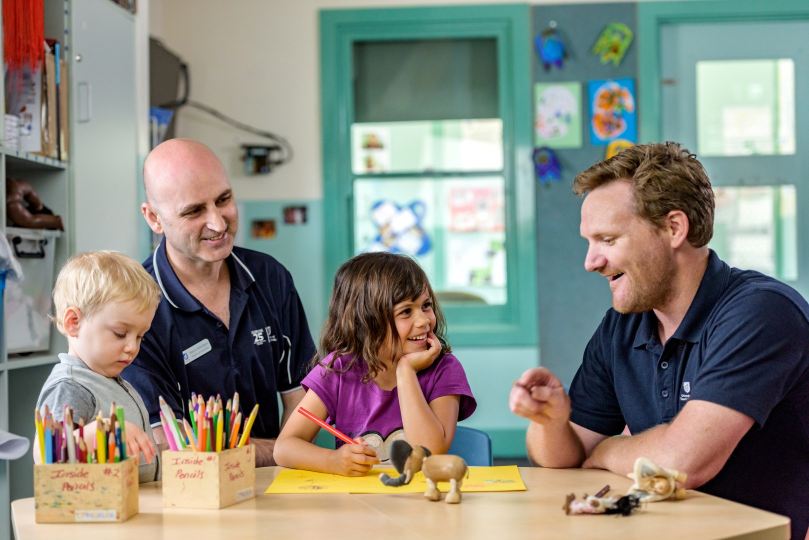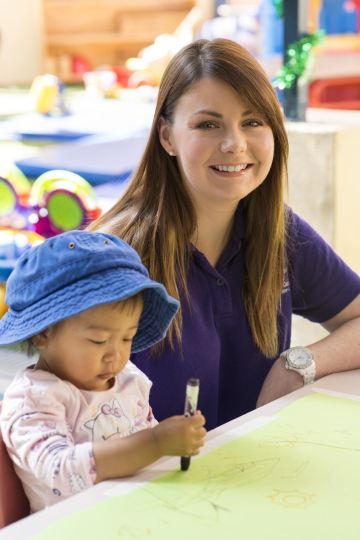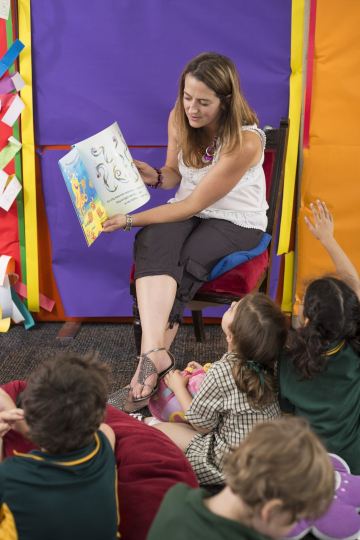Master of Teaching (Early Childhood)
Degree Level Postgraduate
Year 2025
You're considered an Australian student if you are any of the following:
Degree Level Postgraduate
Year 2025
Mode
On-campus
Applicants must have completed:
Critical information regarding Learning Areas entry requirements can be found here.
-----Additional entry requirements-----
In accordance with national teacher education program standards, applicants must also fulfil non-academic entry requirements. All applicants will be required to submit a 400-600 word Teaching Capabilities Statement with their application. Complete information on content, format and submission is available here.
Applicants are advised that a successful Working with Children Check (WWCC) with the Department of Human Services is required for all preservice teachers prior to undertaking any professional experience placement or site visit that involves contact with minors (under 18 years of age). Information on the procedure to be followed for obtaining clearance can be found on the Professional Experience Placement website.
---------------------------------------------------------------------
To be eligible for Master of Teaching (Early Childhood) with 1 year of Advanced Standing applicants must have completed an Initial Teacher Education degree (i.e. Bachelor of Teaching or three-year Diploma of Teaching) accredited by AITSL (or prior to 2010 a previous equivalent accrediting body) in the field of Early Childhood or Primary teaching. Additionally, applicants must have completed a minimum of two years of full-time employment as an early childhood teacher (children ages 0-5 years) or two years full-time employment as a junior primary or primary school teacher (children ages 5-8 years) in Australia within the last five years. Applicants eligible for 1.0 EFTSL of advanced standing complete the program in 1 year of full-time study or equivalent part-time study.
12024 THE Subject Rankings
2Results for Specialist Studies in Education – 2018 Excellence in Research for Australia (ERA).
3UNSTOPPABLE® is a Kellogg Company trade mark used under licence. Ranked #43, 2024 THE Young University Rankings.

This industry-relevant postgraduate qualification is for students who have already completed a three-year bachelor’s degree and would like to increase their employment prospects with an early childhood qualification.
The curriculum is practical in nature and is solely focused on the education of children from birth to eight years of age. Practical learning is a major component and you will complete three supervised placements in childcare, preschool/kindergarten and junior primary schools, totalling 85 days.
The Early Childhood specialisation is taught at the Magill campus only.
Advanced Standing
You may be eligible for Advanced Standing and complete the requirements of this qualification in one year. Please see the entry requirements for further details.
When applying through SATAC, please refer to the following codes. If you are uncertain about your eligibility for Advanced Standing, please include more than one SATAC code in your list of application preferences.
Please note that this degree cannot be studied 100% online. Most courses are delivered in a blended mode; with a mixture of online and on-campus components. Some courses offered a fully online delivery.
The Australian Government is providing financial support for initial teacher education (ITE) students commencing full-time teaching degrees from 2024. You could be eligible for up to $20,000. Conditions apply. Find out more.
WWCC clearance
Preservice teachers will be required to undertake a Working with Children Check (WWCC) through the Department of Human Services (DHS). The clearance will be valid for five years. The WWCC must be completed prior to being accepted for a placement and can take up to six to eight weeks to be processed. Strict confidentiality is maintained during the DHS clearance process. If a preservice teacher fails to obtain clearance for any reason, the University cannot accept responsibility for obtaining a professional experience placement or any other professional experience activity that a preservice teacher may require to complete the course of study. If preservice teachers cannot undertake a professional experience placement or any other professional experience activity which is a compulsory part of the program, they cannot graduate with an Initial Teacher Education degree from UniSA.
Mandatory child-safe environments training.
All education students who are completing any in-school or site (i.e. preschools and childcare settings) observations, activities or professional experience placements must undertake mandatory training in Responding to Abuse and Neglect prior to the commencement of the activities or placements. In South Australia, child protection legislation and policy require all organisations to establish and promote child-safe environments. Mandatory reporting of child abuse and neglect training is required of all individuals working with children and young people. All undertaking professional experience placements in South Australian government and non-government schools and preschools must provide documented evidence (i.e. a certificate) that shows they have completed all the required training from one of the providers mentioned on the following website.
Literacy and Numeracy Test
All preservice teachers must meet the required standard in the national Literacy and Numeracy Test for Initial Teacher Education (LANTITE) to be eligible for program completion and graduation. Preservice teachers will attempt LANTITE as they progress through their program. Preservice teachers will be required to successfully achieve both the literacy and numeracy components of LANTITE as a prerequisite for enrolment in their final Professional Experience Placement course. The University will provide a range of supports for preservice teachers to help them achieve the required standard. Preservice teachers will be allowed three attempts at each test. Any preservice teacher who fails to meet the standard on three occasions in either the literacy or numeracy test will be counselled regarding options.
Please note new entry requirements and learning area specialisations.

This degree has been designed to develop skilled, committed and flexible early childhood educators.
The focus is on practical learning, particularly relating to the principles and concepts relevant to early childhood development and learning. You will focus on four major areas:
You will also study mandatory courses in:
Courses studied will include on-campus lectures and workshops; some courses will also be offered fully online or with online support. Learning will be supplemented with online lectures, learning activities, readings and discussion boards.
During the degree you will participate in four supervised placements in childcare, preschool/kindergarten and junior primary schools, totalling 85 days.

We are South Australia's largest tertiary provider of education degrees. Practical learning is a major focus and you will gain industry experience starting in your first semester.
As Australia’s university of enterprise:
Our commitment to research with an industry focus is unprecedented in South Australia. In the 2018 nationwide Excellence in Research for Australia evaluation, 100 per cent of our assessed research was rated world-class or above2. It’s a very good time to choose UniSA for your postgraduate study.
1Ranked #43, 2024 THE Young University Rankings.
2Results for Specialist Studies in Education - 2018 Excellence in Research for Australia
If you want to make a difference, have an interest in childhood development, and have the patience, warmth, integrity and communication skills needed when working with young children, this master’s degree may be for you.
This specialised teaching field shows promising job prospects, with very strong growth in Australia1. Careers to consider:
1Australian Government, National Skills Commission, Job Outlook 2020.
Successful completion of this program provides a recognised academic qualification which will enable graduates to apply for teacher registration in South Australia, interstate and some overseas countries. Applicants should note there are other criteria determining eligibility for registration by the Teachers Registration Board of South Australia and other registration and regulatory authorities. Applicants are advised to check registration requirements as they are subject to change.
This program has been approved by the Australian Children's Education and Care Quality Authority (ACECQA) as an Early Childhood Teaching Qualification for the purposes of the Education and Care Services National Law.
Have any questions? We're here to help! Contact Adelaide University's Future Student Enquiries Team.
Applying to study with us:
-----Additional entry requirements-----
In accordance with national teacher education program standards, please note that as part of your SATAC application, you are also required to meet non-academic entry requirements.
All applicants who wish to commence study in our Education degrees are required to submit a 400-600 word Teaching Capabilities Statement in addition to your SATAC application. This supports the national priority to ensure those entering the teaching profession have the personal qualities to best support learners and graduate as classroom ready, high quality teachers.
The Teaching Capabilities Statement complies with the national Australian Institute for Teaching and School Leadership (AITSL) initial teacher education program standard of academic and non-academic entry requirements. Further information can be found on the Entry Requirements page.
Every year, over 2,500 UniSA students are supported in their studies through scholarships and grants worth millions of dollars. Check out the scholarships below. One of them may be perfect for you. Visit our scholarships page for more.
Available for students who are interested in undertaking specified activities with the aim of enhancing the overall student experience at UniSA.
Travel Grants are available to participate in our Study Overseas Programs. UniSA has agreement with over 80 institutions globally.
Our campuses have fantastic facilities including modern lecture theatres, libraries, workshops, laboratories, tech zones, and spaces that simulate real work environments. You’ll also find student gyms and campus sport activities to keep you active. We also offer flexible study options, with online resources available for accessing lecture recordings, virtual classrooms, library resources and learning support.
Adelaide also has a variety of accommodation options to suit different requirements and budgets. Options include dedicated student accommodation and private rentals. See our long-term accommodation pages, or explore our student accommodation by Scape on Bank Street in Adelaide’s lively cultural precinct, an ideal location for students. It is within easy reach of UniSA’s city and metropolitan campuses, Rundle Mall shopping, the Central Market, Chinatown, and the West End’s vibrant nightlife. It is also across the road from the Adelaide train station, and on bus and tram routes.
My vision is to work collaboratively to equip graduates with qualities that promote learner achievement and wellbeing, which transfers to productive citizenship.
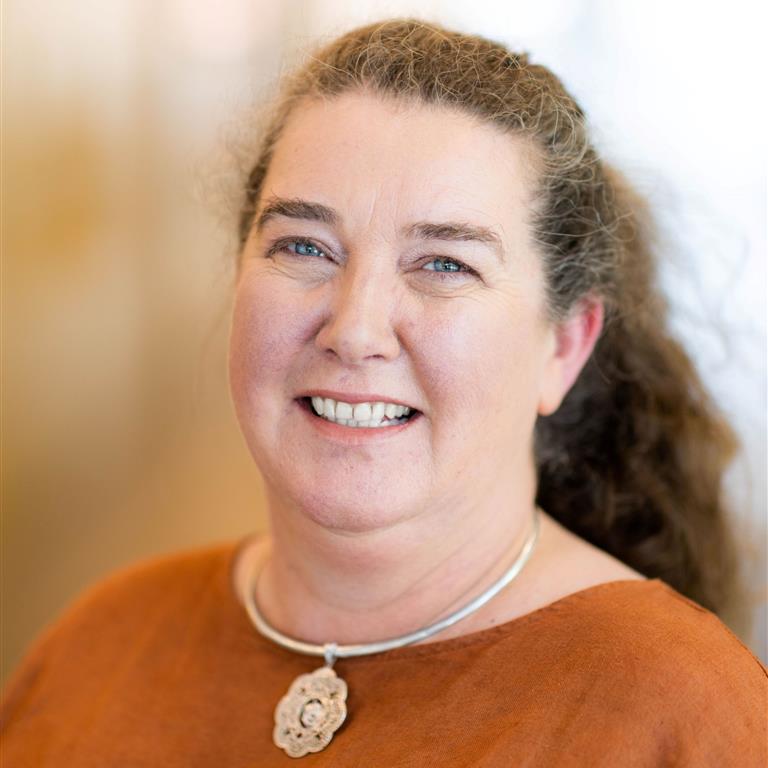
The way you apply for UniSA will depend on the undergraduate or postgraduate coursework degree you're interested in studying.
The majority of applications are made via the South Australian Tertiary Admissions Centre (SATAC). Check out more information on the SATAC website and follow the appropriate process for your degree of interest.
There are a small number of degrees that you need to apply for through direct application processes. The process you need to follow will be listed on the 'How to Apply' section of the degree homepage, but you'll also be taken to where you need to go if you hit the 'apply' button.
If you are interested in studying one of our 100% online degrees you'll need to apply directly to UniSA Online.
You can find more information about the application processes for UniSA on our How to Apply webpage.
If you're more interested in applying for a postgraduate degree by research, check out and follow the information in our step by step guide to applying.
Applications for all degrees will close ahead of study commencing, but the timelines may vary for undergraduate and postgraduate degrees.
The deadline to apply to study a degree at UniSA for semester one (commencing late February) and be guaranteed equal consideration is generally in very late November or early December. While you may be able to apply after this date, you are not guaranteed to be considered equally with other applicants and your application may not be assessed in time for the main round of offers. More competitive degrees may not make any offers after the main offer round. Find more information on the Key Dates section of the SATAC website, but you can also call the Future Student Enquiries team for more information on 08 8302 376.
Many postgraduate by coursework degrees do not have set closing dates. The exceptions are highly competitive degrees, so it is best to check – either on the degree homepage on the SATAC website or by checking with our Future Student Enquiries team.
As most postgraduate applications are assessed as they are submitted and offers are continuous, there are no set closing dates for applications. Degrees can be filled and closed with little notice so it is best to apply as soon as possible to avoid missing out on a place. For more information, please contact our Future Student Enquires team on (08) 8302 2376 or submit an enquiry.
You may be eligible for credit or advanced standing for your chosen UniSA degree based on your previous studies, if they are in a related area and completed within a certain timeframe. Receiving credit or RPL will reduce the number of courses you undertake within the degree, and may also reduce the overall duration of your degree. You can read more about our pre-existing credit agreements through our online Credit Assessor. If you have related industry experience, you may also be eligible to receive recognised prior learning (RPL) for this experience. Credit and RPL is assessed by the Program Director once you've received an offer, and you apply through UniSA's current student experts, Campus Central.
Future Student Enquiries welcomes the opportunity to meet with you to discuss your study options at UniSA. We can discuss degree information, entry requirements and pathways, applications, general career outcomes and student life, so you have the information to make the best study decision for your future. Head to our Book an Appointment webpage to find a date and time to speak with us, and take your next steps on journey to university study.
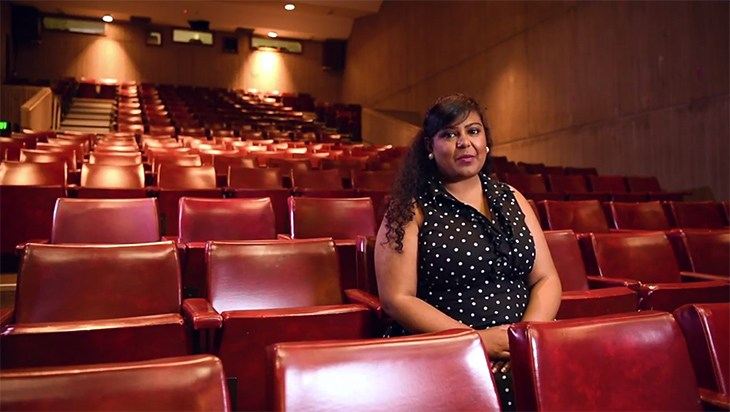
Hear from Jean as she shares her experiences studying a Master of Teaching at UniSA and her journey as a Bachelor of Arts graduate.
